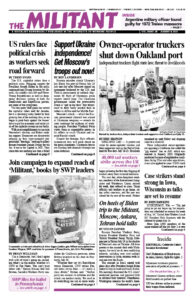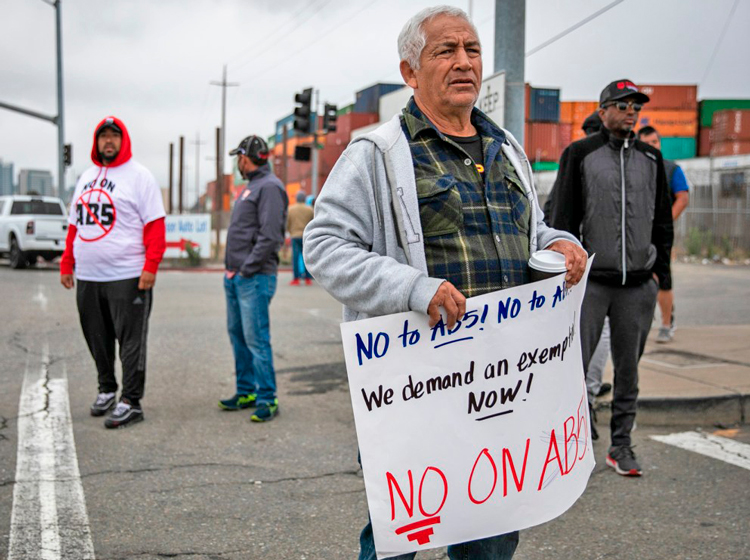OAKLAND, Calif. — A protest and strike by owner-operator truckers and their supporters tied up the Port of Oakland for five days July 18-22. Hundreds began picketing the first day, flagging all truckers away from terminal entrances.
The next day, when longshore workers, members of the International Longshore and Warehouse Union, arrived for work, they refused to cross. Union officials told workers to go home, citing safety concerns, and the port was closed for the rest of the week. Pickets remained up until Friday and shipping came to a standstill.
These independent owner-operators are opposing a California law called the “gig worker” law, or AB5, which was enacted in January 2020. Originally motivated because of exploitative conditions facing Uber and other app drivers, it was also applied to some 70,000 truck owner-operators. Challenges to the law by trucking firms have lost in court.
The majority of drivers out of the Port of Oakland are owner-operators, and the protesters overwhelmingly own only one truck, which they drive. AB5 forces them to either hire on as employees at a shipping company or to set themselves up as a one-person “corporation,” and face the fees and licensing that requires, and dealing with all the paper work.
“I would effectively be both the worker and the boss, filling out forms on how I was paying myself,” one trucker told the Militant.
The port, one of the busiest in the U.S., resumed normal operations July 25, with some truckers protesting in areas the cops designated as “free-speech zones” and others staying home.
Owner-operators already face big challenges in making a living, including all the costs of operating a truck, from maintenance to gas. A set of new tires costs thousands. Insurance can be another $2,000 a month. On top of that are fees levied by multiple government agencies, from vehicle registration to business licenses. Cops are continually issuing citations, which can be as much as $10,000, for things like hauling over the weight limit. This is considered the drivers’ responsibility, but truckers say it’s the shippers’ fault if they put on too much freight.
The rates truckers are paid don’t keep up with inflation, trucker Ich Le told the Militant, so he has to work two jobs. Despite long hours, he says it’s still a struggle.
Miguel Iraheta, who has driven for 28 years, said he has to buy a new truck because California environmental laws require all trucks to be less than 13 years old, and that will cost some $200,000. He said it now takes $2,000 to fill his tank!
AB5 was sponsored by former Democratic state Assemblywoman Lorena Gonzalez, who is now head of the California Federation of Labor. The bill was backed by Teamster union officials and some truckers as a response to a real problem — shipping and trucking bosses profiting from the abuse of owner-operators, who are forced to absorb all the costs of running a truck without being able to collectively negotiate for higher wages, medical benefits and pensions, and who are forced to wait uncompensated for hours while their trucks are loaded and unloaded.
Some of these truckers want to be treated as employees of the shipping companies, but instead are treated as “contractors” so the bosses can keep their labor costs down.
Port truckers need union, SWP says
Joel Britton, Socialist Workers Party candidate for California governor, joined the truckers’ picket lines. “No legislation, especially a dictate imposed on them that owner-operators believe will make their situation worse, can substitute for building a union and developing the leadership needed among the truckers themselves,” he told the Militant.
“Gov. Gavin Newsom’s arrogant refusal to even meet with the owner-operators is a lesson in the disastrous consequences of substituting reliance on Democratic Party politicians for a course of class struggle.”
Britton said he told picketing truckers how the Teamsters union organized owner-operators along with other drivers into the union as part of the massive strikes that transformed their fighting power in Minneapolis and across the Midwest in the 1930s. He said many recognize that they need to be more organized.
Iraheta told the Militant that he would welcome being part of a union if he could maintain his status as an owner-operator. “Unions are where we can get our strength,” he said.
“It’s good the longshore workers supported us when they saw our protest,” Alfonso Juarez, who has worked as an owner-operator for 25 years, told the Militant. The truckers paid by the run get nothing when they have to spend long hours being loaded. This gets blamed on the dockworkers. “Maybe this fight will help us unite more in the future. ”
“We’ve got to support the truckers,” longshore worker Carlos Gomez said when he saw the pickets. The ILWU is currently in contract negotiations with the West Coast port bosses’ association.


